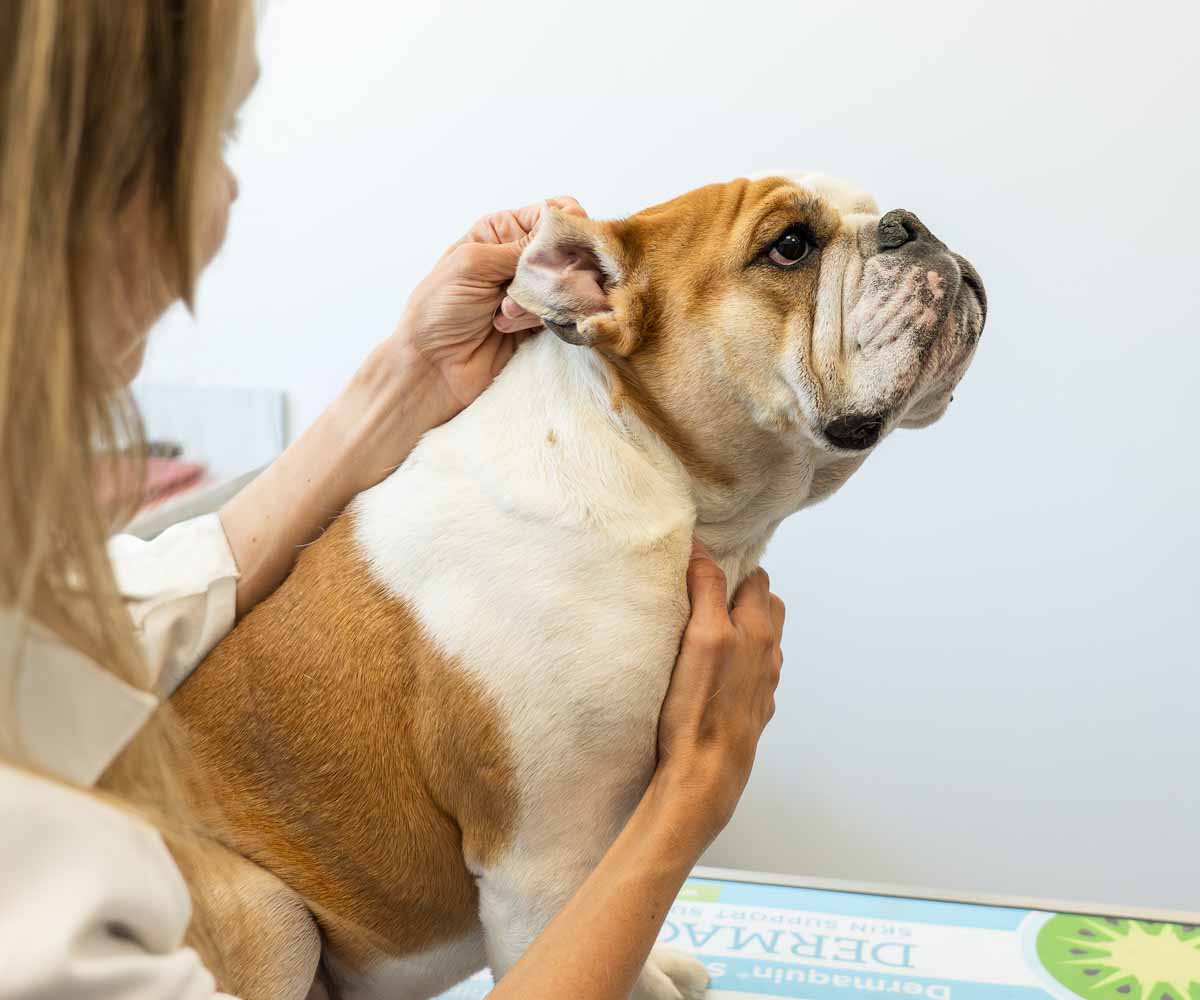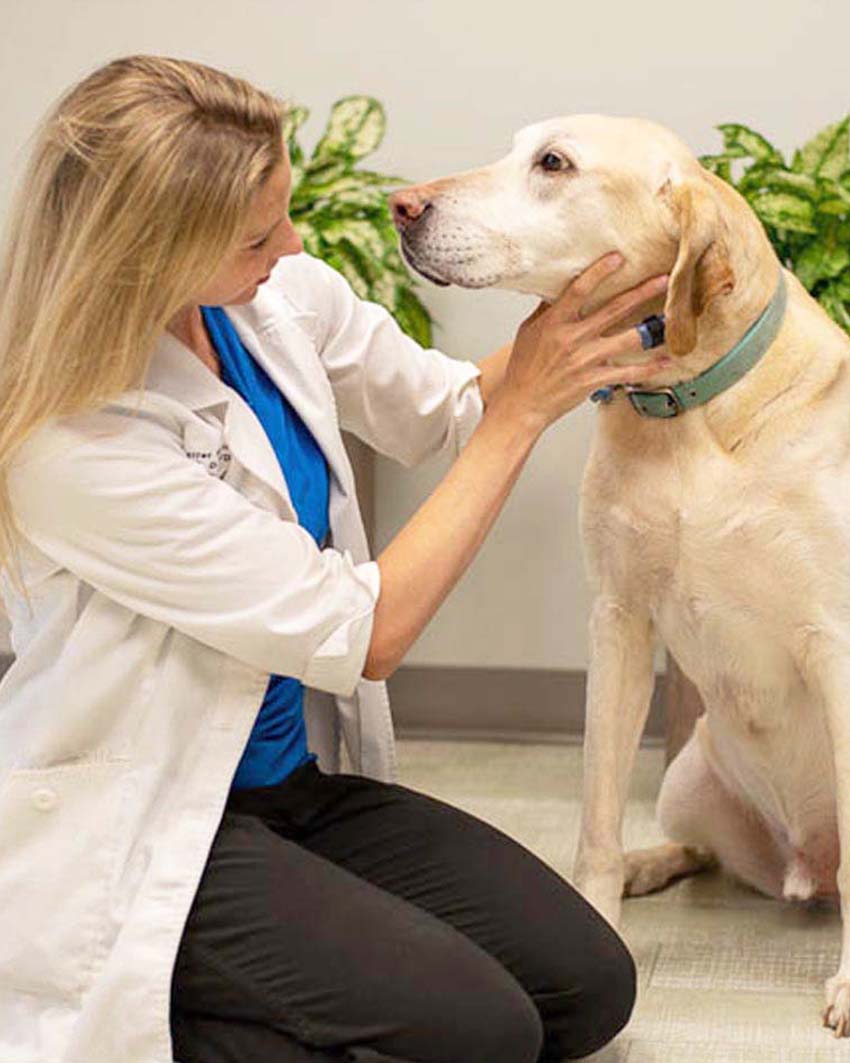Veterinary Dermatology & Allergy
Overview | What to Expect | Team | Contact
We diagnose and treat conditions that affect your pet’s skin, ears, nails, and anal glands.
From the initial exam to your pet’s tailored treatment plan, we will work with you to find comfort and relief for your pet. Skin conditions are one of the top reasons why owners seek veterinary care for their pets. Although many diseases that dermatologists treat are chronic and incurable, they are diseases that can be effectively managed by a board certified dermatologist and have a good prognosis. We will take the time to work with your family in creating a long term personalized plan to control your pet’s symptoms.
VRCCO Dermatology & Allergy
62889 NE Oxford Ct.
Bend, Oregon 97701
541-209-6960
Directions
Allergy Types
There are four types of allergies in the dog and cat:
1. Food Allergy
2. Insect Allergy
3. Environmental Allergy (pollens, dust, etc.)
4. Contact Allergy
These different types of allergies can manifest in skin rashes and itch (scratching, biting, chewing, licking). Determining which allergy your pet has, can be difficult since the above allergies look very similar. The dermatology service relies heavily on your pet’s history and physical examination to determine the most likely cause. For many patients a tailored process of elimination will be necessary to make the diagnosis and provide the best treatment. Our ultimate goal is to identify the allergen and discontinue anti-itch medications which have long term side effects.
Environmental allergy (atopy) is a progressive disease, meaning that most pets will get worse over time. Allergy specific immunotherapy (allergy vaccine) is the only way to stop the progression of environmental allergies. Medications can treat the symptoms of allergies, but these medications are “band-aids” and not treating the root of the problem. Additionally, these medications can have serious side effects and for many patients stop working as allergy symptoms progress.
Allergy specific immunotherapy is best formulated using an intradermal test. In fact, the American Academy of Veterinary Dermatology recognizes the intradermal test as the gold standard. During this test your pet is mildly sedated, and approximately 60 allergens are injected underneath the skin. The injection sites are graded on the appearance of hives that result. The dermatologist will then use that information to create an immunotherapy protocol specific to your pet. Another test, called “serum allergy testing” in conjunction with a dermatologist’s expertise could be used to develop an immunotherapy protocol and may be a cost-effective alternative to intradermal testing.
Immunotherapy may be administered in two forms – oral or subcutaneous (underneath the skin). Our staff will provide training so that you are comfortable with giving subcutaneous injections at home. Most owners elect to do injectable because maintenance therapy only requires one injection approximately every three weeks; whereas, oral requires once to twice daily administration. Both forms are approximately equal in cost and effectiveness.
Immunotherapy is a long process and this can be frustrating. Results from immunotherapy can take 3-12months. During that time, we may use medications to keep your pet comfortable with the goal of slowly weaning off and stopping these medications.
Common Issues We Address
Common endocrinopathies in the dog include hypothyroidism and Cushing’s disease (hyperadrenocorticism). These two conditions can cause loss of hair, brittle hair, changes in hair color, and skin infections. Seasonal flank alopecia is another disease that also may involve hormones.
Cats, also can have skin and hair coat changes due to endocrine disorders. Cats may have similar changes to the hair and coat as dogs from hyperthyroidism and thymomas. Blood tests may be utilized to diagnose these disorders. In certain cases a skin biopsy may be needed.
These conditions are characterized by dysregulation of the immune system that cause the body to attack itself. In some cases a trigger (infection, virus, drug) may cause the dysregulation – your dermatologist will carefully look over your pet’s history to identify this trigger.
For most of these conditions a skin biopsy with submission to a dermatohistopathologist is necessary for diagnosis. Most pets with these conditions can live long and healthy lives, but most will require life-long medical management.
Common immune mediated conditions are listed below:
- Pemphigus Foliaceous
- Discoid Lupus Erythematosus
- Symmetrical Lupoid Onychodystrophy
- Hepatocutaneous Syndrome
- Erythema Multiforme
- Toxic Epidermal Necrolysis
Cutaneous lymphoma (mycosis fungoides) causes generalized red, irritated, and itchy skin in older dogs. Often this form of skin cancer is confused with allergies. Performing skin cytology combined with your pet’s history and examination can raise our suspicion of skin cancer. Definitive diagnosis requires a skin biopsy.
Most skin infections, especially those caused by bacteria and yeast, are secondary to another disease process. The most common underlying cause of bacteria and yeast infections in dogs and cats are allergies. Endocrinopathies (disease of an endocrine gland) can also cause skin infections. Clinical signs of skin infections include scaling (flaky skin), hair loss, and itch (scratching, biting, chewing). It is very important to treat the infections, as well as the underlying cause, so that the infection does not re-occur. In some cases, an infection may be primary, meaning there is no underlying cause.
Primary Infections
- Dermatophytosis (ringworm)
- Mycobacterium
- Systemic fungal diseases (cryptococcus)
- Parasitic diseases
- Demodicosis
- Sarcoptes
- Hookworm
- Cheyletiella
Diagnosis of most of these diseases is usually straightforward for a board certified dermatologist. The dermatologist may use a combination of skin cytology, skin scrapes, and fungal cultures. For deeper infections, such as mycobacterium, a skin biopsy may be necessary to perform histopathology and culture.
Procedures
We are able to remove small masses and treat certain dermatological conditions with our C02 laser. This method of treatment has several advantages over conventional surgery.
- Most procedures can be done by numbing the skin prior to the procedure. Often sedation and general anesthesia can be avoided.
- Less pain – the CO2 laser seals the nerve endings and little to no pain is experienced.
- Minimal hemorrhage (bleeding) and tissue destruction. The laser is a precise tool giving the dermatologist excellent control on how much tissue will be removed. This also limits post-operative swelling and inflammation.
- If a patient has multiple masses/tumors, conventional surgery may be too time consuming to be performed.
1. Removal of small masses: examples include sebaceous adenomas (warts), skin tags and papilloma’s.
2. Removal of cysts.
3. Removal of hemangiomas – small red areas caused by UV light. These tumor types can turn malignant.
4. Removal of tumors in difficult locations such as on the ears and tail.
WHAT TO EXPECT
Dermatology & Allergy Care

Please do not bathe your pet for 3 days before the appointment. Please do not clean your pet’s ears for 1 day before the appointment. Please fully complete your pet’s history form before the appointment. This form will be emailed to you.
Please plan to arrive 10 minutes before your scheduled appointment time to allow for check-in and to give your pet extra time to become more comfortable at our hospital.
After your pet is checked in, the technician will take your pet to the exam room where their weight and vital signs (temperature, pulse, and respiratory rate) will be checked and a history will be obtained. The doctor will then review any medical records provided by your family veterinarian and complete an examination of your pet.
The doctor will discuss their findings and any recommended diagnostics or treatments. There is usually a lot of information to go over on your first appointment. Please expect your initial consultation to take 2-3 hours.
Please help yourself to a complimentary beverage and snack while waiting in our lobby. We also have complimentary WIFI available for our clients.
A treatment plan will be created and reviewed with you. Most dermatological problems take several months to resolve and monthly recheck appointments may be recommended for your pet.
A treatment plan will be provided for any recommended diagnostics and/or treatments. An initial payment will be required for any procedure, surgery, or diagnostic work-up over $600. We gladly partner with CareCredit and Scratchpay to offer financing services to our clients. Please ask our team for more details. We are also happy to assist with submission of pet insurance claims to your pet’s insurance provider. We provide a 10% discount for pet parents in military service.
We accept cash, VISA, Mastercard, Discover, CareCredit and Scratchpay. Personal checks and American Express are not accepted.


DVM, Dermatology
Dr. Jennifer Bentley
Dr. Bentley is a board-certified veterinary dermatologist and native Oregonian. She received her degree in veterinary medicine at Oregon State University, followed by a rotating small animal internship and dermatology internship at the Veterinary Specialty Hospital in San Diego. Dr. Bentley then went on to complete her three-year residency in dermatology at the University of Florida and she has a special interest in antimicrobial resistance. Her research on the subject won the honorable Peter J. Ihrke Resident Research Award.
VRCCO Dermatology is located at our Emergency & Specialty Veterinary Hospital in Bend. To learn more or schedule an appointment call 541-209-6960 or email us at info@vrcvet.com
VRCCO Dermatology & Allergy
62889 NE Oxford Ct.
Bend, Oregon 97701
541-209-6960